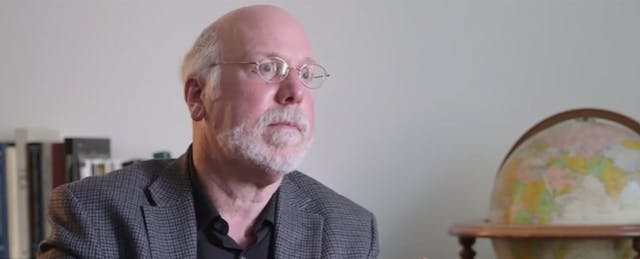Alternative higher education programs don’t always work out. But one former Harvard University dean is giving it a try.
That former Harvard dean, Stephen Kosslyn, opened an online two-year college this week with an experimental academic program promising something between a vocational education and a traditional general-education curriculum.
Among its innovations: no homework.
It’s called Foundry College, and it is a for-profit college that plans to seek regional accreditation so that its students can eventually qualify for financial aid. Its leaders hope to partner with employers and convince them to cover some of the tuition costs for students. The effort secured $6-million in venture backing from Learn Capital. (Disclosure: Learn Capital is an investor in EdSurge.)
All of the courses at Foundry College will be synchronous, meaning that students will all be online at the same time and participate in activities led by professors via video. Each class is designed so that 200 students can attend at once.
None of the college’s courses will assign homework or ask students to do reading before class, Kosslyn said, in what may be a first for a two-year college. Instead, courses will be designed so that students can do everything required during 90-minute class periods. “It’s something we call the ‘contained classroom,’” the college’s founder added.
“It’s not liberal arts, in that it’s not knowledge for knowledge’s sake,” said Kosslyn. The target audience is working adults who want to switch jobs or seek a promotion, he added, rather than 19-year-olds fresh out of high school.
“Vocational education is brittle, and students get put out of a job relatively quickly,” Kosslyn argued. “But standard liberal arts doesn’t prepare people for jobs.” (Though plenty of people disagree with that assertion.) “One of the things that distinguishes us from other offerings out there is the ability to combine the practical knowledge with a general education.”
Kosslyn has helped start an experimental college before. He was founding dean of Minerva, a hybrid four-year online college that aims to attract students who would have gone to selective traditional colleges. Kosslyn left his role as Chief Academic Officer at Minerva to focus on his new institution.
The curriculum at Foundry College is so unique that the college will not accept any transfer credits, according to its Frequently Asked Questions page. Rather than offering courses in subjects such as history, all students will take courses including “Practical Problem Solving,” “Critical Analyses,” and “Clear Communication.”
Kosslyn imagines the skills graduates could come away with could come in handy in roles like as manager of a coffee shop. “Consider what happened at Starbucks the other month, where the manager called the police on two African Americans,” he said, noting an incident that sparked nationwide controversy. “They train their managers with protocols and scripts,” he said, guessing that one of those protocols tasked managers with asking anyone who stayed more than 15 minutes without ordering anything to leave because they are taking up table space. “If [the employees] had been trained to think critically and problem solve and communicate, they might have asked questions and handled the situation differently.”
Educational Upstarts
The effort is the latest attempt to create a faster and more career-focused educational option for students than traditional higher-education offerings.
Earlier this year another for-profit college alternative called MissionU abruptly shut down after just one year, leaving its few graduates without any institution to support them in the long run or any growing alumni network. The company was acquired by coworking giant WeWork, which plans to use the tech platform to start a network of K-12 schools.
Another experimental two-year college in Portland, called Wayfinding Academy, has decided to go the nonprofit route and plans to keep its campuses small so it can focus on helping students decide what they want to do with their lives.
Foundry College, however, is going for scale. After its first year of operation, which will have a small cohort, the goal is to admit everyone who qualifies. Tuition will cost about $12,000 for the full two-year program.
An online-only model could prove difficult for adult students, the audience the college is trying to reach. Research has shown adult students can struggle in virtual classrooms. Acknowledging such findings, Kosslyn said that the college is taking steps to try to keep its students on track.
“Every student will get a coach who will meet with that student every other week, one on one,” he said. “They will also have access to tutors for free,” he added, noting that the college will recruit current and former students who did well to serve as tutors.
The college’s decision to run as a for-profit puts it in a sector where several players have been investigated for overpromising and under-delivering, leaving students in debt and without the jobs they had hoped for.
Kosslyn explained the decision to go for-profit this way: “I don’t know any way to raise the necessary capital for a nonprofit to begin,” he said. “The VC world seems to be more open to innovation.”
He argued that for-profit colleges with poor outcomes have failed to deliver because the “incentives got misaligned.”
“They didn’t follow through on their promises, and we will,” he argued.
Marie Cini, president of the nonprofit Council for Adult and Experiential Learning, welcomed the experimental college.
“This country is ripe for some new models where we just completely rethink how education is delivered,” she said. “This particular model might work, or it might not work, but I'm just happy to see that there are new models coming forward.”
Her hope is that more colleges will start up‚ all trying different curriculums and business models. “I like seeing these sort of experiments,” she concluded. “The more the merrier.”


